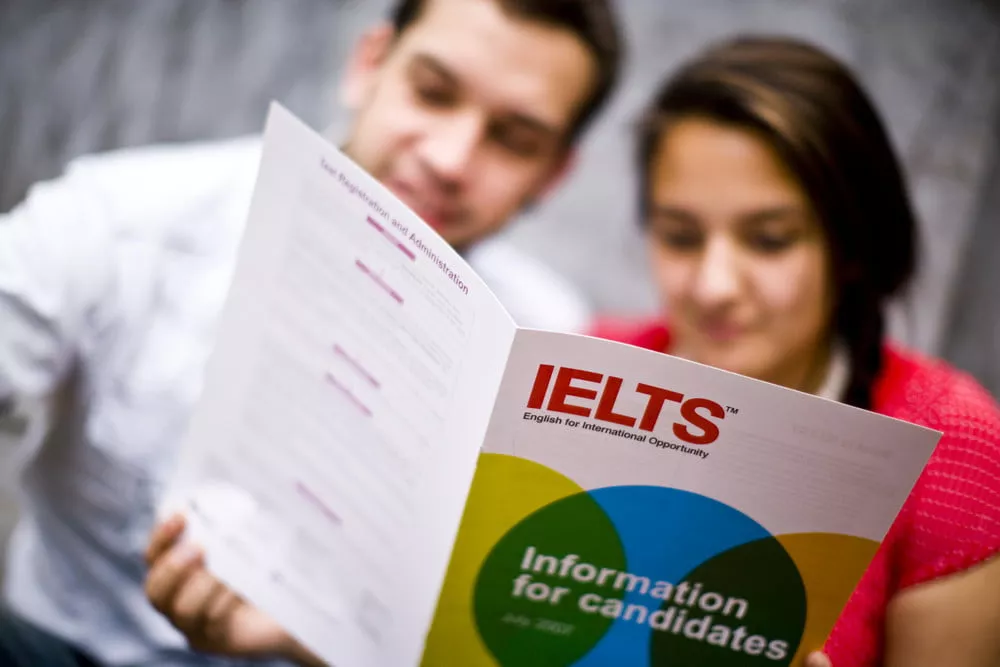هناك طرق كثيرة تساعدك في إجتياز إمتحان الايلتس IELTS بنجاح والأخبار السارة لك نقدم لك نصائح إجتياز إمتحان الأيلتس من خلال التحضير له بشكل أفضل . بالطبع، توجد قوائم من النصائح والهدف منها هو التفكير في كيفية الدراسة . يعتبر الأيلتس نظام إختباراللغة الإنجليزية الدولي . وبإختصار هو نظام إختبار يقوم بتدريس مهاراتك في اللغة الإنجليزية من خلال أربعة جوانب أساسية منها التحدث، الكتابة، القراءة ، الإستماع . في معظم الحالات يعني الإعداد لساعات طويلة من الجلوس والقراءة ولكن يمكنك القيام بالكثير من النصائح لدراسة الأيلتس .
الخطوة الأولى: طور لغتك الإنجليزية!
تعلم اللغة الجديدة أمر يتطلب وقتاً، ومن أفضل الطرق لتعلم اللغة الإنجليزية هي التسجيل في أحد كورسات اللغة، لأن التغذية الراجعة التي تتلقاها من المعلم سوف تساعدك على تحسين مهاراتك اللغوية في المحادثة، والاستماع، والقراءة، والكتابة. احرص على استخدام اللغة الإنجليزية بصورة يومية. احرص على ممارسة القراءة، والاستماع، والتحدث باللغة الإنجليزية؛ فذلك من أفضل الطرق المجربة لتحسين وتنمية مهاراتك في اللغة، وبالتالي تحسين درجة الآيلتس التي ستحصل عليها في الامتحان.
- تحدث بالانجليزية مع عائلتك وأصدقائك.
- استمع إلى محطات الراديو والتليفزيون، وشاهد الأفلام الناطقة بالإنجليزية. حاول أن تستمع إلى العديد من اللهجات الإنجليزية، مثل الأمريكية، والأسترالية، والبريطانية، والكندية، والنيوزلندية.
- احرص على قراءة المطبوعات المكتوبة باللغة الإنجليزية، مثل الصحف والمجلات، كلما كان ذلك ممكناً.
- تمرن على كتابة الخطابات أو الملاحظات باللغة الإنجليزية كي تحسن مهارات الكتابة لديك.
الخطوة الثانية: تعرف على شكل وقواعد امتحان الآيلتس
- تعرف على شكل وقواعد امتحان الآيلتس. تذكر أنه يوجد نوعان من اختبارات الآيلتس: اختبار الآيلتس الأكاديمي و اختبار الآيلتس العام. يتفق كلا النوعين في اختباري المحادثة والاستماع، لكنهما يختلفان في اختباري القراءة والكتابة. تعرف على المزيد من المعلومات عن أجزاء اختبار الآيلتس عبر هذا IDP.
- احرص على قراءة كتيب المعلومات للمتقدمين لاختبار الآيلتس للتعرف على المعلومات الأساسية والضرورية الخاصة بكيفية الإجابة الصحيحة على الأسئلة. يمكنك أيضاً الحصول على نسخة من هذا الكتيب من مركز اختبارات الآيلتس الذي قمت بالتسجيل فيه.
- تعرف على أهم النصائح المعتمدة لاجتياز اختبار الآيلتس.
- احرص على قراءة الإخطار الخاص للمتقدمين للامتحان.
- احرص على التعرف على مستويات درجات الايلتس التسعة، وفهم ما يعنيه كل مستوى من هذه المستويات.
- احرص على التعرف على النقاط التي يبحث عنها الممتحِنون في اختباري المحادثة والكتابة من خلال قراءة معايير تقييم اختبار الآيلتس.
- تعرف على الحقائق التي تمكنك من النجاح في اختبار الآيلتس، ولا تلتفت إلى الشائعات والخرافات التي تسمعها عن الامتحان، كي لا تشتت ذهنك وقدرتك على التركيز في الامتحان.
الخطوة الثالثة: تدرب على أسئلة الامتحان
- تدرب على أسئلة امتحان الآيلتس قبل فترة كافية من دخول الامتحان.
- يمكنك التدرب على أسئلة امتحان الآيلتس من خلال كتب النماذج الرسمية لاختبار الآيلتس، والتي يمكن شراؤها عبر الموقع الرسمي للأيلتس أو من خلال مركز اختبارات الآيلتس الأقرب لك.
- يمكنك أيضاً شراء العديد من المواد التعليمية الخاصة بامتحان الآيلتس والتي تصدر عن العديد من شركات النشر الدولية.
وبالإضافة إلى التدرب على أسئلة امتحان الآيلتس، يمكنك أيضاً أن تسجل في أحد البرامج أو الكورسات التي تؤهلك لدخول الامتحان، فمثل تلك الكورسات ستساعدك على:
- التدرب على نوعيات الأسئلة التي ترد في امتحانات الآيلتس، مثل كتابة المقال القصير أو الخطاب في اختبار الكتابة.
- الحصول على مساعدة المعلم المختص عند التدرب على الأسئلة.
- الشعور بمزيد من الثقة عند أداء المهام التي يتطلبها الامتحان.
- اتخاذ القرار بخصوص موعد امتحان الآيلتس المناسب لك.
الخطوة الرابعة: حاول أن تشعر بالاسترخاء في يوم الاختبار
- اقض بعض الوقت قبل الامتحان في تنشيط ذاكرتك، ومحاولة تذكر قواعد وأجزاء اختبار الآيلتس، وكذلك مكان الاختبار حتى تشعر بالاسترخاء وتتجنب أي ضغط نفسي أثناء الامتحان.
- احرص على قراءة كتيب المعلومات للمتقدمين لاختبار الآيلتس مرة أخرى، فهو يحتوي على كل المعلومات الضرورية لمساعدتك على تحقيق أفضل النتائج في الاختبار.
- احرص على قراءة الإخطار الخاص للمتقدمين للامتحان.
- احصل على قدر كافي من النوم المنتظم في ليلة الامتحان.
- رتب رحلتك جيداً. تعرف على مكان انعقاد الامتحان وكيفية الذهاب إليه قبل يوم الامتحان كي تضمن عدم التأخر عن الموعد المحدد للوصول.
الخطوة الخامسة: تعرف على ما يجب أن تتوقعه في يوم الامتحان
تعرف على بعض النصائح المفيدة التي تساعدك على الشعور بالاسترخاء وتحقيق النجاح في اختبار الآيلتس.
نصائح للنجاح
- تأكد من معرفتك الجيدة بشكل الامتحان وأجزائه حتى تتجنب المفاجآت يوم الاختبار.
- تدرب جيداً على نماذج الأسئلة، وتعرف على معايير التقييم المستخدمة لامتحان الـ”IELTS”.
- سجل لنفسك وأنت تتحدث باللغة الإنجليزية أو خلال إجرائك لاختبارات الآيلتس التدريبية ثم استمع للتسجيل لمعرفة متى تلعثمت أو كررت الكلمات أو ارتكبت أخطاء في قواعد اللغة أو تكلمت بسرعة مبالغ فيها، فهذه هي العناصر الأربعة الرئيسية لتقييمك في المحادثة.
- قم بوضع خط تحت الكلمات المحورية في الأسئلة أثناء اختبارات الاستماع والقراءة والكتابة، وتأكد من أنك تعرف ما هو المطلوب منك في الإجابة. قم بوضع خطة للإجابة عن الأسئلة قبل البدء.
- تعلم وتعرف على الكلمات المترادفة (أي الكلمات المختلفة ذات المعنى نفسه). فسوف تلاحظ غالباً في اختبارات الاستماع والقراءة وجود كلمة محورية في السؤال ثم ستقرأ/ستستمع إلى كلمة مختلفة بنفس المعنى في النص، وسيكون عليك التعرف على هذه الروابط. كما أن استخدام هذه الكلمات المترادفة يفيدك أيضاً في اختبارات المحادثة والكتابة لإظهار مدى ثراء المفردات التي تعرفها.
- راجع إجاباتك جيدا أثناء اختبارات الاستماع والقراءة، وتأكد أنك اتبعت التعليمات وإلا قد تخسر بعض الدرجات.
- احصل على قدر كاف من الراحة في ليلة الامتحان، واحرص على الوصول قبل بدايته بوقت كاف، فوصولك متأخراً سيحرمك من تقديم أفضل ما لديك.
Following these 5 tips can help you prepare and ace the IELTS Exam:
- Record expressions that can be used in a variety of academic contexts.
- Record phrases (rather than individual words)
- Use a good monolingual dictionary to check proper word arrangement
- Avoid spending too much learning highly specialized words
- Record useful expressions related to these topics
- Practice talking and writing about them in English
- Use newspapers, magazines and news websites to learn more
- Skim and scan to form a general picture of a text quickly
- Make sure you know exactly what’s required for each task
- Check all instructions carefully
- Use the work for further clues about the content and organization of the text
- Remember the key vocabulary may be explained for you in the text
- Don’t use a dictionary until you’ve done the task and checked your answers. You can read an English newspaper every morning and listen to the news in English
- Practice timed writing to improve your speed
- Never write answers BELOW the minimum length
- Remember that Task 2 is longer and has more marks, so leave enough time for it
(Task 1)
- Describe the information, not the diagram itself (e.g. you don’t need to say exactly what’s shown on the vertical and horizontal axes of a graph)
- Select the important features and choose figures to support these
- To practice, look for diagrams, graphs, and charts in the newspaper or on the Internet and analyze them. Notice how diagrams are used on TV programs
(Task 2)
- Analyze the question carefully
- Make a paragraph plan before you write
- Check that all parts of the question are addressed
- Always leave time to edit your writing
- Know your common mistakes and check for them
For Fluency:
- Practice talking for a considerable long time
- Talk aloud in English to hear yourself pronounce the words
- Record yourself speaking on different topics as often as you can
For Pronunciation:
- Listen to spoken English (e.g. on radio/TV/ films) as much as possible
- Repeat phrases after the speaker in recordings to help you speak in word groups and use stress and intonation appropriately
- Record and listen to yourself speaking as much as you can
- Use the preparation time to think about the task content and focus
- Make sure you know exactly what’s required for each task and check the instructions
- After checking your answers, listen again, and try to work out the cause of any problem
How to improve:
- Remember that you only hear the recording once. Don’t pause the CD when you’re practicing
- Finally, listen once more to the tapescript and highlight useful expressions
These helpful tips will equip you to be ready for the exam. However, your success rate depends on your commitment and practice. A combination of the two will give you a great chance of getting the desired grade for IELTS.
نِظَامُ اخْتِبَارِ اللُّغَةِ الْإِنْجِلِيزِيَّةِ الدَّوْلِيُّ (بالإنجليزية: International English Language Testing System؛ اختصارًا IELTS، وتقرأُ «أَيِلْتس») هو اختبار معياري دولي لمدى إتقان اللغة الإنجليزية عند المتحدثين بها غير الأصليين. أُجرِيَ أولُ اختبارِ أيلتس في عامِ 1989 مـ، وهو الآن أحدُ اختباراتِ اللغةِ الإنجليزيةِ الرائدةِ في العالم. في عام 2018 مـ، أَجرَى هذا الاختبارَ أكثرُ من ثلاث ملايين ونصف مليون طالب حول العالم، ليصبحَ بذلك أحدَ أكثرِ اختباراتِ اللغةِ الإنجليزيةِ شعبيةً في العالم.[1]
المصدر : ويكيبيديا
Nexus American Academy® 1999 : 2024
عضو مجلس الاعتماد الأمريكي – مؤسسة تعليمية دولية مستقلة معترف بها من قبل مجلس الاعتماد للكليات والمدارس الدولية
INTELLECTUAL DEVELOPMENT THROUGH PERSISTENT PURSUIT OF KNOWLEDGE




 (2,993,142 votes, average: 4.40 out of 5)
(2,993,142 votes, average: 4.40 out of 5)You need to be a registered member to rate this.


